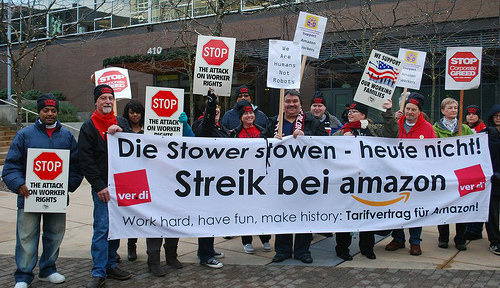



Ver.di, formed in 2001, is a union with 2.4 million members, mostly in the service sector.
Amazon faced a similar, but smaller and less militant strike in 2013 and decided to take preventive measures to protect its sales in Germany, its second largest market after the United States.
So it set up three warehouses in Poland and two in the Czech Republic.
Still, more workers struck in 2014 in more German warehouses and for longer periods than in 2013. The strikes kicked off on Dec. 8 and finished Dec. 24. They involved all but one of Amazon’s warehouses.
These strikes hit Amazon at its peak time for sales. On Dec. 15, last year, Amazon in Germany received 4.6 million orders, which worked out to 53 sales per second. (reuters.com, Dec. 15)
Ver.di is demanding that Amazon workers be classified as “retail workers,” whose minimum salary in Germany is 13 euros (about $15.90) an hour rather than “logistical workers,” whose minimum is 9 euros (about $10.80) an hour.
Amazon management times its “pickers” [the workers who assemble orders] to the second to squeeze every last drop out of the workers’ labor. Workers are not allowed to talk to each other, which not only limits union organizing but also cuts out normal human exchanges, like “How are your kids?”
Workers who break out sobbing or cursing because they can’t maintain the intense effort of walking up to 15 miles a shift, finding an item, loading it and going on to the next task in the few seconds allotted are fired on the spot.
All these burdens on the workers have made working conditions an important part of the dispute.
Ver.di recently has gotten the German courts to keep Amazon from requiring work on Sundays. In no way, shape or form has Amazon management indicated it would recognize Ver.di as representing Amazon workers in Germany.
Amazon pays only 3 euros an hour in Poland, as opposed to 9 in Germany — and Polish workers have also challenged Amazon management. Workers are bringing legal complaints about the intensity of work and the distances workers have to walk. They also protest being regularly assigned to work 10 hours instead of 8 and that they don’t get paid for the time spent for security checks at the end of work.
Labor unions from the European countries where Amazon has a presence held a meeting in July 2014 to coordinate their efforts on behalf of Amazon workers. The militant strikes hitting Amazon management in the middle of the busy holiday season in Germany have set an example for others, in Europe as well as in the United States.
This statement was recently issued by over 30 groups. On Friday, March 28, Dr. Helyeh…
By Jeri Hilderley I long for peace and ease as stress and anxiety overtake me.…
Los siguientes son extractos de la declaración del Gobierno de Nicaragua del 9 de abril…
The following are excerpts from the statement of the Nicaraguan government on April 9, 2025,…
The following is a statement from the organization Solidarity with Iran (SI) regarding the current…
By Olmedo Beluche Beluche is a Panamanian Marxist, author and political leader. This article was…